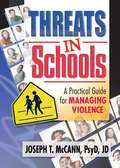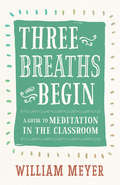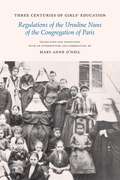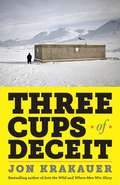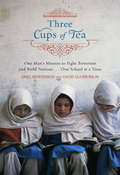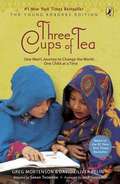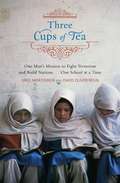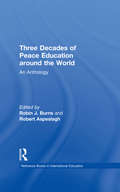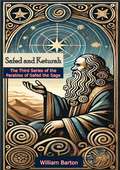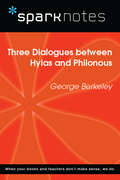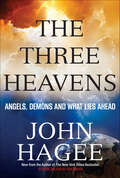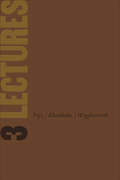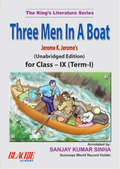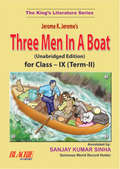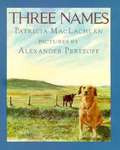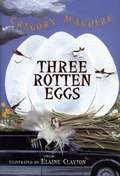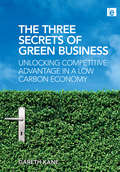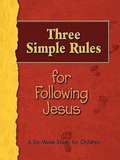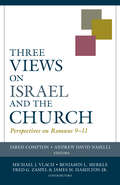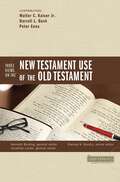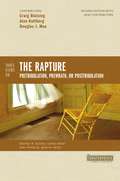- Table View
- List View
Threats in Schools: A Practical Guide for Managing Violence
by Joseph T MccannManage potentially violent situations in your school with these expert techniques!In the wake of several highly publicized school shootings, the problem of school violence has increasingly become a focus of concern for the general public as well as teachers, school officials, and students. Drawing on case studies from publicized violent incidents as well as from Dr. McCann's private practice, Threats in Schools: A Practical Guide for Managing Violence provides techniques for identifying, conceptualizing, assessing, and managing threatening behavior by students in school settings. Offering specific case management strategies for a variety of situations, this indispensable volume provides guidance on formulating questions to ask and suggestions for developing strategies for managing potentially violent situations.Integrating threat assessment and risk management models, this approach will help you target potential threats to property, other students, teachers, and school staff. The interdisciplinary approach recognizes that violent behavior is dependent on the characteristics of the perpetrator, victim, and setting, and that the relationship between threats and violence is not always clear. Threats in Schools offers well-grounded research, detailed case studies, and theoretical approaches to help you deal with the tough issues, including: zero-tolerance policies and their more effective alternatives why profiling techniques to identify violence-prone students are of limited use interventions to defuse potentially violent situations critical incident stress managementFive appendixes offer forms and checklists to help you plan and evaluate, including: threat assessment and management planning checklist of characteristics of perpetrators of school violence questions for evaluating general risk of violence fire-setting and bombing risk assessment sex offense risk assessmentLucidly written and illustrated with helpful tables and figures, Threats in Schools offers school officials, mental health professionals, community leaders, and the media the information they need to understand what sparks school violence and which approaches reduce the risk of it.
Three Breaths and Begin: A Guide to Meditation in the Classroom
by William MeyerLEARN THE TRANSFORMATIVE POWER OF MEDITATION IN THE CLASSROOM Meditation can be a potent practice for creating focus and facilitating learning in the classroom, for kindergarteners, grad students, and everyone in between. Longtime schoolteacher William Meyer has taught a variety of meditation techniques to students, fellow teachers, and parents with remarkable results. In Three Breaths and Begin, Meyer details how teachers can incorporate mindfulness into their curricula every day. He covers every aspect of teaching meditation, from creating a dedicated space in the classroom to meditating on field trips, in sports settings, and even in the midst of tragedy. Offering numerous ready-to-use scripted meditations, this insightful, practical, and loving guide will benefit anyone interested in the well-being of students — and, most of all, the students themselves.
Three Centuries of Girls' Education: Regulations of the Ursuline Nuns of the Congregation of Paris
by Mary Anne O’NeilIn Three Centuries of Girls’ Education, Mary Anne O’Neil offers both an examination and the first English translation of Les Règlemens des religieuses Ursulines de la Congrégation de Paris. Published in 1705, Regulations is the first pedagogical system explicitly designed for the education of girls. It is also one of the few surviving documents describing the day-to-day operations of early Ursuline schools. O’Neil traces the history of the document from the writings of the Italian foundress of the Ursulines, to the establishment of the religious order in Paris in 1612, to the changes in the organization of Ursuline schools in nineteenth-century France, and, finally, to Mother Marie de St. Jean Martin’s spirited defense of the traditional French Ursuline method after World War II. In the eighteenth century, New Orleans Ursulines used the Regulations as a guide to establish their schools and teaching methods. Overall, O’Neil’s history and translation recover a vital source for historians of the early modern era but will also interest scholars in the fields of education history and female religious life.
Three Cups of Deceit: How Greg Mortenson, Humanitarian Hero, Lost His Way
by Jon KrakauerThree Cups of Deceit uncovers the deception behind Mortenson's public image.
Three Cups of Tea
by Greg Mortenson David Oliver RelinGreg Mortenson stumbled, lost and delirious, into a remote Himalayan village after a failed climb up K2. The villagers saved his life, and he vowed to return and build them a school. The remarkable story of his promise kept is now perfect for reading aloud. Told in the voice of Korphe’s children, this story illuminates the humanity and culture of a relevant and distant part of the world in gorgeous collage, while sharing a riveting example of how one person can change thousands of lives. .
Three Cups of Tea
by Greg Mortenson David Oliver RelinThe astonishing, uplifting story of a real-life Indiana Jones and his humanitarian campaign to use education to combat terrorism in the Taliban's backyard Anyone who despairs of the individual's power to change lives has to read the story of Greg Mortenson, a homeless mountaineer who, following a 1993 climb of Pakistan's treacherous K2, was inspired by a chance encounter with impoverished mountain villagers and promised to build them a school. Over the next decade he built fifty-five schools--especially for girls--that offer a balanced education in one of the most isolated and dangerous regions on earth. As it chronicles Mortenson's quest, which has brought him into conflict with both enraged Islamists and uncomprehending Americans, Three Cups of Tea combines adventure with a celebration of the humanitarian spirit.
Three Cups of Tea (Young Reader's Edition)
by Greg Mortenson David Oliver Relin Sarah ThomsonThis young readers edition of the worldwide bestseller Three Cups of Tea has been specially adapted for younger readers and updated by Greg Mortenson to bring his remarkable story of humanitarianism up to date for the present. Includes a special interview by Greg's twelve-year-old daughter, Amira, who has traveled with her father as an advocate for the Pennies for Peace program for children.
Three Cups of Tea: One Man's Mission to Fight Terrorism and Build Nations...One School at a Time
by Greg Mortenson David Oliver RelinSlamming over the so-called Karakoram "Highway" in his old Land Cruiser, taking great personal risks to seed the region that gave birth to the Taliban with schools, Mortenson goes to war with the root causes of terror every time he offers a student a chance to receive a balanced education, rather than attend an extremist madrassa. If we Americans are to learn from our mistakes, from the flailing, ineffective way we, as a nation, conducted the war on terror after the attacks of 9/11, and from the way we have failed to make our case to the great moderate mass of peace-loving people at the heart of the Muslim world, we need to listen to Greg Mortenson.
Three Decades of Peace Education around the World: An Anthology (Reference Books in International Education #Vol. 24)
by Robin J. Burns Robert AspeslaghFirst Published in 1996. Routledge is an imprint of Taylor & Francis, an informa company.
Three Degrees of Glory: A Discourse
by Melvin J. BallardThree Degrees of Glory: A Discourse by Melvin J. Ballard is an insightful and spiritually uplifting exploration of the Latter-day Saint (LDS) doctrine concerning the afterlife. Originally delivered as a sermon in 1922, Ballard’s discourse provides a detailed and heartfelt explanation of the three degrees of glory—the Celestial, Terrestrial, and Telestial Kingdoms—as revealed in LDS scripture, particularly Doctrine and Covenants 76.With clarity and compassion, Ballard describes the purpose of mortal life, the process of judgment, and the rewards that await individuals in the life to come, based on their faithfulness and personal choices. He explains the distinct characteristics and blessings of each kingdom, with the Celestial Kingdom representing the highest degree of glory, reserved for those who fully embrace Christ’s teachings and make sacred covenants. The discourse also touches on the opportunities for progression and redemption in the next life, reflecting God’s justice and mercy.Ballard emphasizes the importance of agency, repentance, and striving for spiritual growth, inspiring believers to align their lives with gospel principles. His words offer comfort and hope, reassuring listeners that God’s plan is one of love and fairness, allowing each soul to find peace and happiness according to their efforts and desires.This discourse has become a cherished part of LDS literature, often referenced for its eloquent explanation of complex theological concepts in a way that is accessible and relatable. Three Degrees of Glory serves as both a doctrinal guide and a source of personal encouragement, urging individuals to live with purpose and prepare for the eternal journey ahead.For those seeking to understand LDS beliefs about the afterlife or deepen their spiritual understanding, Ballard’s work remains an inspiring and influential message about God’s eternal plan for His children.
Three Dialogues between Hylas Philonous (SparkNotes Philosophy Guide)
by SparkNotesThree Dialogues between Hylas Philonous (SparkNotes Philosophy Guide) Making the reading experience fun! SparkNotes Philosophy Guides are one-stop guides to the great works of philosophy–masterpieces that stand at the foundations of Western thought. Inside each Philosophy Guide you&’ll find insightful overviews of great philosophical works of the Western world.
Three Heavens: Angels, Demons and What Lies Ahead
by John HageeAs sales of Hagee's current New York Times bestseller, Four Blood Moons, continue to soar, hundreds of thousands of readers have had their thirst whetted to know what is to come at the end of this world . . . heaven itself! Hagee's national media power assures another mega-bestseller.
Three Lectures: University of Toronto Installation Lectures, 1958
by Northrop Frye Clyde Kluckhohn V. B. Wigglesworth Murray G. RossHundreds were turned away from these lectures given on the day of the installation of Dr. Claude Bissell as President of the University of Toronto. Professor Frye spoke on "Humanities in a New World"; Professor Kluckhohn on "The Scientific Study of Values"; and Professor V.B. Wigglesworth on "Science: Pure and Applied".
Three Men in a Boat Class 9 (Term-1)
by Jerome K. JeromeUnabridged Edition for Class 9 Term 1. Annotated by Sanjay kumar Sinha
Three Men in a Boat Class 9 (Term-2)
by Jerome K. JeromeUnabridged Edition for Class 9 Term 2. Annotated by Sanjay kumar Sinha
Three Months With the Spirit
by Justo L. GonzalezThree Months with the Spirit is popular author Justo Gonzalez study of the Acts of the Apostles. Eminently readable, the study uses the see-judge-act method to bring readers closer to the text and informs and challenges the daily life of the Christian. These thirteen studies can be used for Sunday school, for evening Bible study, for home study meetings, for faith communities, for retreats, and for personal Bible study. In addition, Three Months with the Spirit can easily be used as a daily Bible study as each lesson is divided into seven parts.
Three Names
by Patricia Maclachlan Alexander PertzoffA Newbery Medal-winning author once again evokes prairie life in this book called "a gift for all generations" by School Library Journal. Here a child's great-grandfather tells a long ago story about life on the prairie and his dog named Three Names accompanied by luminous, impressionistic watercolors. picture descriptions added.
Three Native Nations Of the Woodlands, Plains, and Desert
by Ron Himler Ted Hammond John K. ManosNIMAC-sourced textbook
Three Rotten Eggs (Hamlet Chronicles #5)
by Gregory MaguireThe students of Miss Earth's class in rural Vermont experience an eventful spring when they become involved with a bullying new student, a competitive egg hunt, and genetically altered chicks.
Three Secrets of Green Business: Unlocking Competitive Advantage in a Low Carbon Economy
by Gareth KaneBusiness is coming under increasing pressure from government, customers and campaigning groups to improve its environmental performance. Soaring utility and compliance costs are hitting companies where it hurts - on their bottom line. But there is another way of looking at the green agenda - as an opportunity rather than a threat. Written by renowned green business expert Gareth Kane, this practical 'how-to' guide contains everything you need to know about making your business green and increasing profits. Key features include: ' The Three Secrets of Green Business Success. ' Preparing To Go Green - change management, indicators, communication and marketing. ' Small Steps - the easy actions that will cut waste of materials, water and energy and save you money. ' Huge Leaps - the really big changes that will make your business truly green by changing your processes, products and business models. ' Hundreds of handy hints and tips. ' Checklists and a brainstorming tool Packed with examples, this book provides a highly accessible, practical guide to those who want to introduce sustainability into their business or organization quickly and effectively.
Three Simple Rules for Following Jesus Leader's Guide: A Six-Week Study for Children
by Various Linda R WhitedIdeal for showing children how to be effective stewards of the world around themThis leader's resource helps plan six sessions that will help children:• Learn what it means to care for the world and God’s people• Consider the ways to do good things for their families, their church, their community, and the world• Discover the value of spiritual disciplines and how to practice themThe three simple rules of "Do No Harm," "Do Good," and "Stay in Love with God" are easy enough for children to understand and profound enough to begin a lifelong journey of faith.
Three Views on Israel and the Church: Perspectives on Romans 9-11 (Viewpoints)
by Andrew David Naselli Jared ComptonA comparison of three major views on the relationship between Israel and the churchThe relationship between Israel and the church is a long-standing debate in Christian theology, and Romans 9–11 are the most important chapters for understanding it. How one interprets these chapters determines how one understands biblical theology, how the New Testament uses the Old Testament, and how the old and new covenants are related.To help readers draw their own conclusion, four leading scholars on this issue present a case for their viewpoint, followed by a response and critique from the others. Michael Vlach argues for a future mass conversion and a role for ethnic Israel in the church. Fred Zaspel and Jim Hamilton present a case for a future mass conversion that does not include a role for ethnic Israel. And Benjamin Merkle contends that Romans 9-11 promises neither a future mass conversion nor a role for ethnic Israel.General editor Andrew David Naselli helpfully sets the debate in its larger biblical-theological context in the introduction, while Jared Compton provides a useful summary of the views and interactions at the end of the volume.
Three Views on the New Testament Use of the Old Testament (Counterpoints: Bible and Theology)
by Stanley N. Gundry Kenneth BerdingTo read the New Testament is to meet the Old Testament at every turn. But exactly how do Old Testament texts relate to their New Testament references and allusions? Moreover, what fruitful interpretive methods do New Testament texts demonstrate? Leading biblical scholars Walter Kaiser, Darrel Bock and Peter Enns each present their answers to questions surrounding the use of the Old Testament in the New Testament. Contributors address elements such as Divine and human authorial intent, the context of Old Testament references, and theological grounds for an interpretive method. Each author applies his framework to specific texts so that readers can see how their methods work out in practice. Each contributor also receives a thorough critique from the other two authors. A one-stop reference for setting the scene and presenting approaches to the topic that respect the biblical text, Three Views on the New Testament Use of Old Testament gives readers the tools they need to develop their own views on this important subject. The Counterpoints series provides a forum for comparison and critique of different views on issues important to Christians. Counterpoints books address two categories: Church Life and Bible & Theology. Complete your library with other books in the Counterpoints series.
Three Views on the Rapture: Pretribulation, Prewrath, or Posttribulation (Counterpoints: Bible and Theology)
by Stanley N. Gundry Douglas J. Moo Craig A. Blaising Alan HultbergThe rapture, or the belief that, at some point, Jesus’ living followers will join him forever while others do not, is an important but contested doctrine among evangelicals. Scholars generally hold one of three perspectives on the timing of and circumstances surrounding the rapture, all of which are presented in Three Views on the Rapture. The recent prominence of a Pre-Wrath understanding of the rapture calls for a fresh examination of this important but contested Christian belief. Alan D. Hultberg (PhD, Trinity International University and professor of New Testament at Talbot School of Theology) explains the Pre-Wrath view; Craig Blaising (PhD, Dallas Theological Seminary and president of Southwestern Baptist Theological Seminary) defends the Pre-Tribulation view; and Douglas Moo (PhD, University of St. Andrews and professor of New Testament at Wheaton College) sets forth the Post-Tribulation view. Each author provides a substantive explanation of his position, which is critiqued by the other two authors. A thorough introduction gives a historical overview of the doctrine of the rapture and its effects on the church. The interactive and fair-minded format of the Counterpoints series allows readers to consider the strengths and weaknesses of each view and draw informed, personal conclusions.
Three Ways to Be Brave: A Trio of Stories
by Karla ClarkThree stories of triumph combine to empower young readers to look inward for strength and create their own definition of bravery.Told in gentle, rhyming couplets, this collection of stories presents relatable moments of unease and the strength found in conquering fears. A roaring nighttime thunderstorm, the first day of preschool, and a doctor's visit, in turn, encourage young readers to forge their own paths of strength in times of distress. Illustrated in rich, emotional scenes that depict vignettes of daily life, this book provides comfort and empowerment for resilience and resolution.
